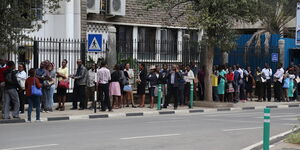National Treasury and Economic Planning Cabinet Secretary John Mbadi is planning to introduce a new tax policy that will see Kenyans working remotely outside Kenya register for a mandatory Kenya Revenue Authority (KRA) Personal Identification Number (PIN).
The proposal falls under the Tax Laws (Amendment) Bill, 2024; the Tax Procedures (Amendment) Bill 2024, and the Public Finance (Amendment) Bills as the government seeks new revenue streams.
"Pursuant to Article 174 and Article 232 of the Constitution, the National Treasury on September 17, 2024, invited the public to submit their views and proposals on transactions for which a Personal Identification Number (PIN) is Required for Kenyans working remotely abroad."
The Bill seeks to amend the First Schedule to the Tax Procedures Act, which provides for transactions that require a PIN to include registration of an employee working remotely outside Kenya for an employer in Kenya.
The Bill proposes that employees working remotely outside Kenya for an employer in Kenya should have a KRA PIN.
So what does this new tax proposal mean to Kenyans working remotely outside Kenya?
From an Interview with Economist and Tax Policy expert Churchill Ogutu, Kenyans.co.ke has established that Kenyans abroad but working for firms in Kenya remotely, will still be liable to pay taxes to Kenya.
This means that although you are working remotely from a foreign nation, you will still need to have a registered KRA PIN that will see you pay your taxes to the Kenyan government. According to Churchill, who, just like all of us has not seen the Bill, the tax proposal will work just like Pay As You Earn (PAYE).
"What I read from the proposed amendments is a clever way for the government to introduce some progressive aspects of the Finance Bill 2024." Churchill Ogutu noted.
However, there is the worry of double taxation, where the employees would question if this means that they will be paying taxes to the foreign countries they live in, and their country of origin, Kenya.
Well, to resolve this, it will all be taken back to the Kenyan employer to reach a consensus with the foreign nation and caution the employee from the worry of double taxation.
Consideration of tax residency for the employee through tax treaties should be considered to avoid double taxation.
This move implies obligations for both employers and employees, potentially including withholding tax by the employer. The burden is on employers to ensure that the employees they engage have active PINs even when they are working remotely.
The Kenya Revenue Authority revealed the importance of this tax, terming it as a shift from Enforcement to Taxpayer Facilitation on a global front.
KRA seeks to achieve this by its vision to be a globally trusted revenue agency facilitating tax and customs compliance, through strategic outcomes aimed at improving the country’s business environment, bettering the ease of doing business score, and hence achieving improved compliance through data-driven decision-making and a growth in revenue collection.
This new proposal comes at a time when the government continues to champion for Kenyans to apply for jobs abroad. Labour and Social Protection Cabinet Secretary Alfred Mutua announced interviews for positions in Qatar on Wednesday, October 23, which lead to hundreds of Kenyans lining up for the jobs.












